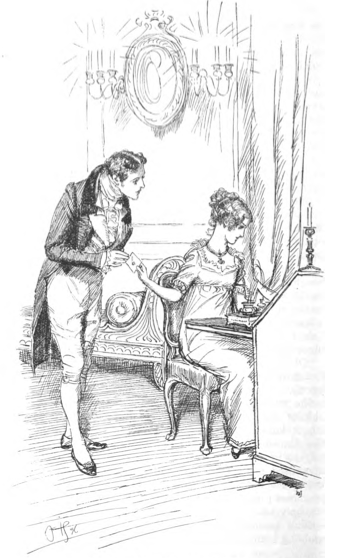This is third in a series of guest posts written by “Sophie” of A Reasonable Quantity of Butter in celebration of Mansfield Park’s bicentennial.
***
“[Sir Thomas’s] displeasure against herself she trusted . . . would now be done away. She should be justified. Mr. Crawford would have fully acquitted her conduct in refusing him”1
To Sir Thomas, Henry’s and Maria’s elopement vindicated Fanny’s refusal. In this, Sir Thomas’s judgment was shallow. Fanny did not reject Henry because she foresaw scandal and disgrace. Henry did not need to be wicked enough to run off with someone else’s wife in order to be a bad choice for Fanny. Her refusal was formed on standards which Sir Thomas did not share and events of which he was not aware. These standards needed no later proof to validate them.
 At the time of Henry’s proposal, Fanny’s knowledge of him was overwhelmingly bad. At almost every meeting, Henry flirted and trifled with an engaged woman—a circumstance which Sir Thomas never learned of. Henry also spoke flippantly about matters which should have commanded his respect. When Fanny said, “I cannot approve his character. . . . I am persuaded that he does not think, as he ought, on serious subjects”2 she had every reason to think so. It would have been foolish to entrust herself, and any children she might have, to such a man, no matter how rich or charming he was.
At the time of Henry’s proposal, Fanny’s knowledge of him was overwhelmingly bad. At almost every meeting, Henry flirted and trifled with an engaged woman—a circumstance which Sir Thomas never learned of. Henry also spoke flippantly about matters which should have commanded his respect. When Fanny said, “I cannot approve his character. . . . I am persuaded that he does not think, as he ought, on serious subjects”2 she had every reason to think so. It would have been foolish to entrust herself, and any children she might have, to such a man, no matter how rich or charming he was.
There was also the fact that Fanny did not love Henry. Among the characters, Sir Thomas alone would disagree that it is wrong to marry someone you do not love. When Edmund tells Fanny, “You did not love him; nothing could have justified your accepting him”3, he is only saying what most people would believe. Even worldly-minded Mary and Henry censure any woman who, “would ever give her hand without her heart.”4 Marrying without love is a wrong not only against yourself, but also against the one you marry.5 To marry Henry when she was in love with another would have been doing him a double wrong.6
Not only did Fanny not love Henry, she did not even like him. His society was irksome to her—both as a suitor and as a friend.“His attentions were always—what I did not like”7 & “his spirits often oppress me”.8 This is the only reason for rejecting Henry that Fanny felt comfortable telling her uncle. But Sir Thomas did not understand the nature of liking: “There is something in this which my comprehension does not reach.”9,10
Fanny’s rejection of Henry is not evidence that she was a prig or a prophet. Rather, it shows that she had common sense and common justice. No matter how imperfect her knowledge of him was, or how he may have changed afterward, Fanny was right to refuse Henry.
***
1Mansfield Park, ch. 47
2Ibid., ch. 35
3Ibid., ch. 35
4Ibid., ch. 5
5Austen censures Rushworth for marrying a woman who he knows doesn’t love him:
“[Maria] had despised him, and loved another; and he had been very much aware that it was so. The indignities of stupidity, and the disappointments of selfish passion, can excite little pity. His punishment followed his conduct,” ch. 48
6Austen’s characters do not marry out of a silly sense of duty, especially when their hearts are otherwise engaged (not like Laura Fairly in The Woman in White).
7Mansfield Park, ch. 32
8Ibid., ch. 35
9His speech continues, “Here is a young man wishing to pay his addresses to you, with everything to recommend him: not merely situation in life, fortune, and character, but with more than common agreeableness, with address and conversation pleasing to everybody. And he is not an acquaintance of to-day; you have now known him some time.”, ch. 32
10I am reminded of Aunt Stanbury in He Knew He Was Right: “I never heard of such a thing in my life. Not love him! And why shouldn’t you love him? He’s a gentleman. Everybody respects him. He’ll have plenty to make you comfortable all your life!”













